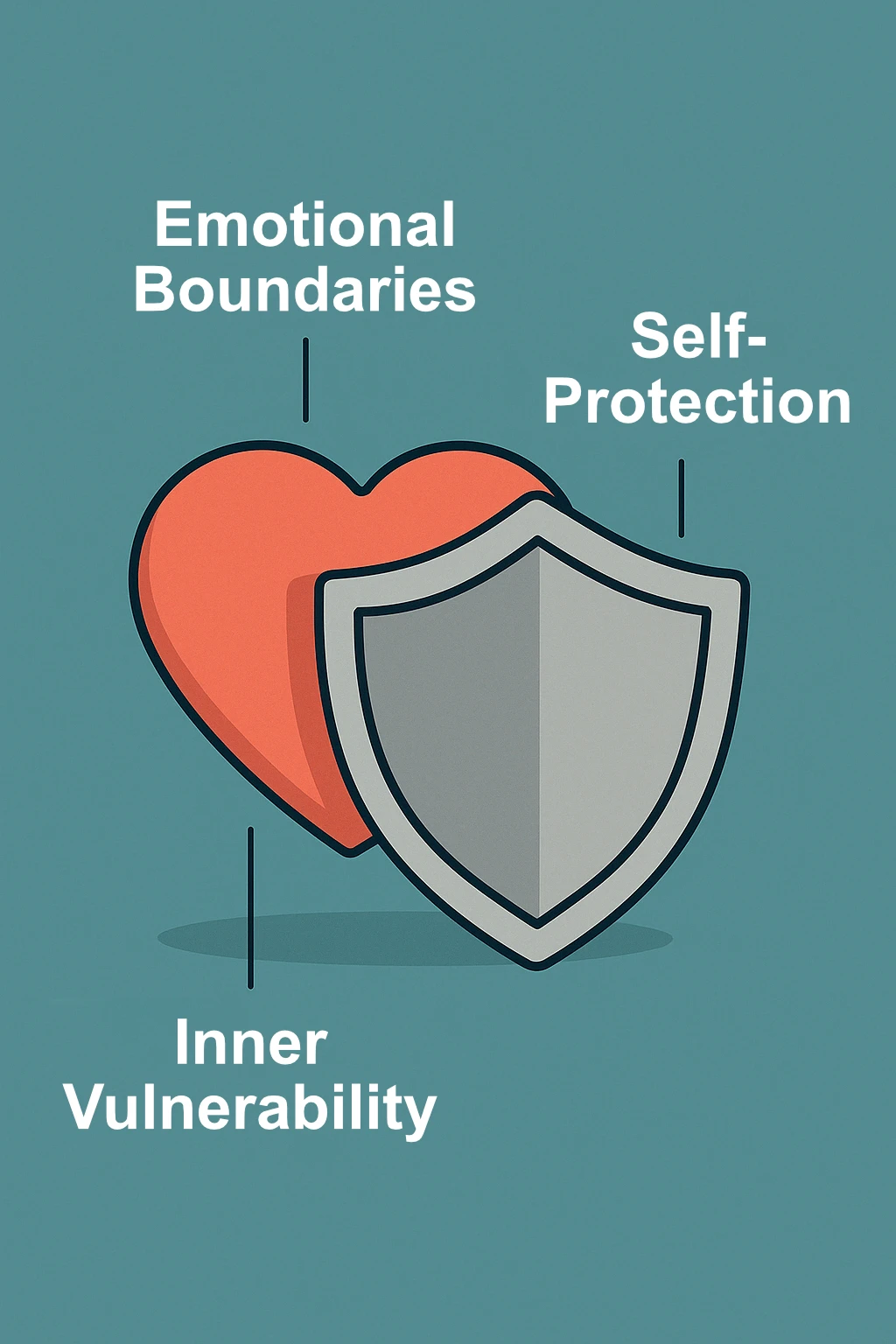Managing Expectations with a Narcissist
What to expect in this article:
Finding Your Footing: A Guide to Managing Expectations with a Narcissist
Hey there, friend.
Ever feel like you’re pouring your heart and hopes into someone, only to be met with reactions that leave you feeling… confused? Maybe hurt, or just plain exhausted? Yeah, I get that. It’s like running on a treadmill, working hard but getting nowhere. It can really drain you.
If you find yourself dealing with someone who shows narcissistic traits, you might notice that the usual ways of relating just don’t seem to click. It can feel like you’re speaking different languages, constantly hitting an invisible wall. It’s baffling and deeply frustrating.
This post is about finding some solid ground again. It’s about managing expectations with a narcissist. Now, that doesn’t mean giving up hope entirely or becoming cold. Not at all. Instead, it’s about adjusting your focus, changing the lens you look through, so you can protect your own peace of mind. Think of it as learning a new way to navigate a tricky landscape. I’m no expert, just someone who’s walked a similar path. I want to share what I’ve learned, hoping it might help you find your footing too.
Why Your Standard Playbook Doesn’t Work Here
You know how relationships usually work, right? There’s give and take. You expect some level of understanding, maybe an apology if someone messes up, a bit of fairness. We kind of learn this unspoken relationship playbook as we go through life. However, when narcissistic traits are in the picture, that playbook often goes out the window.
Why? Well, people with these traits often struggle to see things from another person’s point of view. Empathy can be really difficult for them. They might resist admitting fault because deep down, it feels threatening to their sense of self. Often, there’s a powerful need for control or to be seen as special or superior. As a result, their reactions might seem self-centered or lack the warmth you expect.
So, if you keep expecting the usual responses – fairness, shared responsibility, genuine empathy – you might find yourself repeatedly disappointed. It’s like trying to fit a square peg into a round hole. It just doesn’t work, and it leaves you feeling worn out. This difference is why managing expectations with a narcissist becomes so crucial. It’s not about them; it’s about saving your own energy and sanity.
If you keep expecting the usual responses – fairness, shared responsibility, genuine empathy – you might find yourself repeatedly disappointed.
Takeaway:
Standard expectations of empathy, fairness, and accountability often don’t apply due to narcissistic traits like lack of empathy and resistance to change, leading to frustration if not adjusted.
Step One: Seeing Things As They Are (It’s Okay to Grieve What Isn’t)
This first step is maybe the hardest, but it’s the bedrock for everything else. It involves something called “Radical Acceptance.” That sounds fancy, but it just means acknowledging reality, exactly as it is, without arguing with it in your head. Specifically, it means accepting that the person behaves the way they do.
This isn’t about liking their behavior. It’s definitely not about condoning anything hurtful or unfair. Instead, it’s about stopping the internal fight. It’s about letting go of the constant thought, “They should be different,” or “If only they would…” That mental battle is exhausting.
Accepting reality helps you set realistic expectations. You can’t build a solid plan if your foundation is based on wishing things were different. Sometimes, this acceptance involves a sense of loss. You might need to grieve the kind of relationship you hoped for – one based on mutual support, deep understanding, or shared vulnerability. That grief is real, and it’s okay to feel it. Remember, this acceptance is a gift you give yourself. It frees up energy that you can use to focus on what you can control.

Takeaway:
Practice “Radical Acceptance” – acknowledge the reality of their behavior without fighting it internally. This acceptance is for your peace, even if it involves grieving lost hopes.
What’s Realistic Then? Setting a New Baseline

Once you start accepting the reality of the situation, you can begin setting a new baseline for your expectations. This isn’t about lowering your standards for how you deserve to be treated overall, but about predicting likely outcomes in this specific dynamic.
For instance, instead of hoping for deep, empathetic listening during a tough time, you might adjust your expectation to anticipate the conversation shifting back to them. Instead of expecting them to take responsibility for a mistake, you might mentally prepare for potential excuses or blame-shifting. It sounds a bit bleak, I know, but it’s incredibly helpful.
Why? Because it helps you detach emotionally from the outcome. When you have a more realistic idea of what might happen, based on past patterns, their behavior doesn’t hit you with the same force. You’re less likely to be caught off guard or feel personally wounded each time. Recognizing their typical patterns is key. Managing expectations with a narcissist often means understanding their likely limitations and not setting yourself up for repeated disappointment. It’s about seeing the pattern and adjusting your sails.
Perhaps learning more about specific traits can help?
Takeaway:
Adjust your expectations based on their patterns of behavior (e.g., anticipate self-focus, lack of accountability) to avoid repeated surprise and disappointment.
Turning the Focus Inward: You’re in Charge of You
Here’s where things can start to feel a bit more empowering. There comes a point where you truly internalize this truth: You cannot control another person. You can’t control their thoughts, their feelings, their choices, or their behavior. Trying to do so is like trying to hold water in your hands – it just slips through.
So, where does your real power lie? It lies within you. You are in charge of your own actions and can control how you respond to situations. It is up to you to decide what you will engage with and where you will invest your precious emotional energy. You choose how you care for yourself.
This shift in focus is huge. It moves you out of the victim role, where you feel powerless against their actions, and into a place of agency. Instead of constantly reacting to them or trying to fix them, you start proactively managing yourself and your environment in relation to them. This internal shift is fundamental to successfully managing expectations with a narcissist. You take the steering wheel back into your own hands.
Takeaway:
Shift your energy from trying to control or change them to managing your own responses, boundaries, and well-being – this is where your true power lies.
Boundaries: Your Personal Peace Protectors
We hear a lot about boundaries, and sometimes it feels complicated. But let’s simplify it. Think of boundaries as clear guidelines you set for yourself to protect your own well-being and peace. They aren’t about controlling the other person; they are about deciding what you will do or accept.
For example, a boundary might sound like: “If the conversation turns into yelling, I will calmly state that I need to step away.” Or, “I will not engage in discussions that constantly put me down.” Or even, “I will limit my interactions with this person to necessary situations.”
Think of boundaries as clear guidelines you set for yourself to protect your own well-being and peace.
Why are boundaries so vital when dealing with narcissistic traits? Because individuals with these traits may consciously or unconsciously push limits, disregard others’ needs, or use manipulation. Boundaries act like a fence around your emotional yard. They protect your energy, your self-respect, and your sense of reality.
Making them work requires clarity and consistency. You need to know what your limits are. Then, you need to follow through. The “consequence” doesn’t have to be dramatic; often, it’s simply removing yourself from the interaction. It’s about showing yourself, more than anyone else, that your peace matters.
Need help setting healthy boundaries? There are great resources out there.
Takeaway:
Set clear, consistent boundaries based on what you will accept or do, primarily to protect your emotional energy and self-respect, not to change the other person.
Creating Inner Space: The Art of Emotional Distance

Sometimes, physical distance isn’t possible or practical. However, you can still create emotional distance. Think of it as building a little buffer zone around your heart and mind. It means consciously deciding not to let their behavior penetrate too deeply.
What does this look like? It might mean choosing not to share your deepest vulnerabilities or insecurities with them, knowing that information could potentially be used against you later. Also, it could involve keeping conversations more surface-level, focusing on neutral topics when possible. It means learning not to take the bait when they try to provoke an emotional reaction.
Emotional distance helps reduce the sting. When you don’t invest as much emotional energy into their approval or reactions, their criticisms or lack of empathy have less power over you. Essentially, you’re managing your expectations about the level of emotional intimacy or connection possible in this relationship. It’s a way to protect your inner peace when interactions feel draining or unpredictable. This careful management of your own emotional investment is a core part of managing expectations with a narcissist.
Takeaway:
Protect your inner peace by creating emotional distance – limit sharing vulnerabilities, keep conversations surface-level if needed, and avoid taking emotional bait.
You’re Not Alone in This (Find Your People)
Dealing with narcissistic behavior can be incredibly isolating. You might feel like nobody understands what you’re going through. Friends or family might offer well-meaning but unhelpful advice like, “Just ignore them,” or “Maybe you’re being too sensitive.” This can make you doubt your own reality, which is often a goal of manipulation tactics like gaslighting.
That’s why finding your support system is absolutely crucial. Seek out people who get it or who are at least willing to listen without judgment. This could be trusted friends, supportive family members, a therapist specializing in narcissistic abuse, or even support groups (online or in-person).
Seek out people who get it or who are at least willing to listen without judgment.
Having people who can validate your experiences is like finding an anchor in a storm. They can offer a reality check when you start doubting yourself. They provide comfort, perspective, and the strength you need to maintain those difficult boundaries and realistic expectations. Remember, you don’t have to carry this weight by yourself. Connection is powerful medicine.
Takeaway:
Combat the isolation of dealing with narcissistic behavior by building a strong support system (friends, family, therapist) for validation, perspective, and strength.
Nurturing Yourself is Non-Negotiable
Constantly adjusting expectations, setting boundaries, and navigating difficult interactions takes a huge toll. It’s emotionally and mentally exhausting. Furthermore, being consistently criticized, dismissed, or manipulated can chip away at your self-worth, leaving you feeling depleted or unsure of yourself.
This makes self-care not just a nice idea, but an absolute necessity. It’s about actively replenishing your reserves and reminding yourself of your inherent value, completely separate from how this person treats you or sees you.
What does self-care look like? It doesn’t have to be elaborate spa days (though those are nice too!). Often, it’s the simple, consistent things: Ensuring you get enough sleep. Eating nourishing food. Moving your body in a way that feels good – even a short walk outside. Spending quiet time alone or engaging in a hobby you enjoy. Journaling your thoughts. Anything that fills your cup.
Prioritizing self-care builds resilience. It strengthens you from the inside out. As a result, you become better equipped to handle challenges, maintain your perspective, and stick to those realistic expectations you’ve set for your own well-being.
Need some ideas for self-care, especially after tough times?

Takeaway:
Prioritize consistent self-care (physical and emotional) to replenish your energy, build resilience, and reinforce your self-worth, which can be eroded in these dynamics.
Conclusion: Finding Calm by Adjusting Your Focus
So, navigating a relationship with someone who has narcissistic traits is tough. There’s no sugarcoating that. But managing expectations with a narcissist isn’t about admitting defeat or resigning yourself to misery. Instead, it’s a powerful strategy for self-preservation.The aim is finding calm and stability, even when life feels chaotic. Shifting your focus from trying to change them to managing yourself is key. This path involves embracing radical acceptance, setting realistic expectations, maintaining strong boundaries, creating emotional distance, leaning on solid support, and practicing consistent self-care.
Shifting your focus from trying to change them to managing yourself is key.
Think of it as a journey, not a destination. There will be good days and tough days. Be patient and kind to yourself through it all. Progress, not perfection, is the goal.
Remember, you have strength you might not even realize yet. Keep focusing on what you can control: your responses, your boundaries, your well-being. You’re not alone on this path, and finding peace is possible.
Take care of yourself. I truly hope sharing these thoughts has been helpful. Know that you’re not alone in figuring this out, and finding your own peace is achievable.
Warmly,
Oscar







